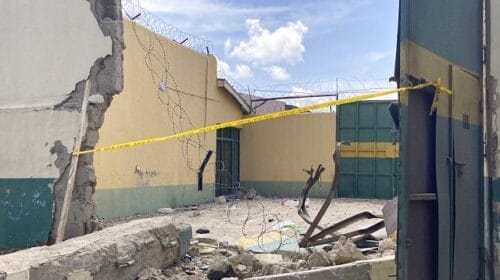African countries protest rogue diplomats: Zambia, Benin, Rwanda, Somalia, DRC, Burundi

Diplomacy is a delicate business that is duly defined as the ‘art of dealing with people in a tactful way’, and comes in handy on occasions where different countries’ interests collide.
African nations play host to several diplomats, who weigh in on the affairs of their hosts’ governments, and in the process take the risk of unsettling the relations between any two countries.
Diplomats are often granted certain privileges and immunities to ensure they may effectively carry out their duties, and also allow for maintenance of government relations, including during periods of difficulties and armed conflict.
While diplomats may not be prosecuted by the host countries, they can be ordered to leave, often within a short period of time.
Article nine of the Vienna convention says the host country can declare any member of foreign diplomatic staff as “persona non grata” and require them to be removed.
This can be done by a state “at any time and without having to explain its decision”, it adds.
In this article, we look at actions by diplomats that have provoked their host countries to take the drastic action of expelling them.
Zambia sends protest letter to Washington
In December this year, Zambia protested the US ambassador’s reaction to jailing of a gay couple. The country’s foreign affairs minister Joseph Malanji told journalists he would send a protest letter to Washington.
US Ambassador Daniel Foote said he was ‘personally horrified to read about the sentencing of two men, who had a consensual relationship, which hurt absolutely no-one’.
Japhet Chataba and Steven Samba were last week sentenced to 15 years in prison by the High Court in the capital, Lusaka.
‘‘To question (the judiciary’s) decision by a representative of a foreign government is tantamount to questioning the Zambian constitution,’‘ Malanji said.
‘‘Until the Zambian constitution is changed to accommodate that, the courts will always rule according to the Zambian constitution.’‘
Homosexuality is illegal in Zambia.
Benin expels EU ambassador
Benin in November 2019 ordered the European Union’s ambassador to the country to leave citing political interference.
The statement described Ambassador Oliver Nette as “harmful,” whiles reiterating that the West African country had nothing against the EU.
“He has interfered too much in domestic affairs,” an anonymous government official told the AFP news agency as saying.
“He constantly calls on civil society to protest against the government,” he added.
Rwanda ‘expels’ German ambassador
Germany’s ambassador to Rwanda, Dr. Peter Woeste left the country on March 30, three months after the Kigali government told authorities in Berlin, they would no longer work with him.
Rwanda accused Woeste of making ‘inappropriate and abusive’ remarks towards the country and its president, Paul Kagame.
“He made inappropriate remarks about Rwanda and about our President. We wrote to Germany showing why we could no longer work with him and they decided to recall him. Our relationship with Germany remains strong,” Olivier Nduhungirehe, State foreign affairs minister told the EastAfrican newspaper.
Woeste presented his credentials in October 2016.
The details of Woeste’s ‘inappropriate and abusive’ remarks are not yet known.
This is the second time Rwanda is expelling a German envoy, having ordered the German representative to leave the country in 2008, after the arrest of its former chief of protocol, Rose Kabuye at an airport in Frankfurt.
Somalia expels UN envoy
This week, Somalia expelled the Special Representative of the U.N. Secretary-General for Somalia, Nicholas Haysom, accusing him of interfering with national sovereignty.
Haysom had written a letter dated Dec. 30 to Somalia’s interior security minister expressing concern over “the alleged involvement of UN-supported Somali security forces in the arrest of Mukhtar Robow on 13 December, the deaths of 15 civilians…on 13, 14, and 15 December…and the arrest of approximately 300 people involved in the demonstrations on 13, 14, and 15 December”.
Robow, the individual referred to in the letter, is a former Islamist al Shabaab militant whose bid to become a regional leader in the country in an election last month was blocked.
READ MORE: Somalia expels top U.N. official over arrest of ex-Shabaab leader
DRC expels EU envoy
Last month, the Democratic Republic of Congo took a decision to expel the European Union ambassador, Bart Ouvry as a reaction to the renewal of EU sanctions against Congolese officials including the ruling coalition’s candidate in a presidential election.
The government had lobbied to have the sanctions against its officials lifted, but the EU Council voted in December to maintain the sanctions which were first imposed in 2016.
‘‘On 10 December 2018, the Council extended the restrictive measures currently in place against the Democratic Republic of the Congo until 12 December 2019. The sanctions comprise an asset freeze and a ban on entering the European Union and are targeted at 14 individuals.’‘
READ MORE: DRC gives EU quit notice, nationwide protest over excluded cities
Burundi vs U.N. Human Rights office
Burundi’s government has taken several actions against the United Nations office in its country, including asking that ‘all international staff are redployed’ and that the office closes ‘within two months’ from December 2018.
In April 2018, Burundi cancelled the visas of human rights experts deployed in the country to investigate crimes against humanity, that could have been committed in the country.
Burundi had suspended collaboration with the human rights office since October 2016, accusing it of “complicity” in the drafting of a UN report that highlighted “serious violations” of human rights and possible “crimes against humanity” by Burundian authorities.
SUGGESTED READING: Burundi clashes with AU over arrest warrant against ex-President
While the affected diplomats face the consequences of leaving the country hastily, and could end up on blacklists for those particular countries, relations between the governments and international institutions like the United Nations often continue.




